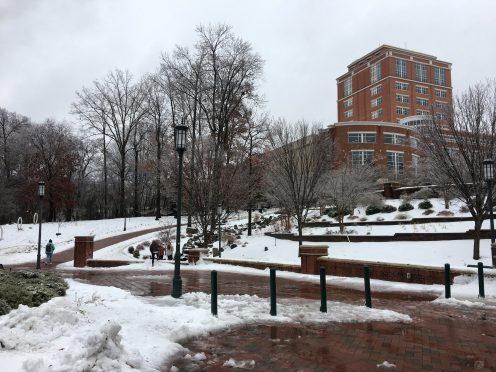Getting Ready for Your Departure to the US:
Once accepted by your host university, it’s of utmost importance to start your predeparture preparations as soon as possible. The quicker you sort out all visas, passport applications or any other travel admin, the less stress for you and your family when it comes to the time for you to leave.
The best source of information on all questions relating to visas are government websites. The US Immigration website tells you exactly how to apply for your visa and clearly states the documents you’ll need throughout the application process.
In order to get a J1 visa (a visa specifically for exchange students), you’ll need to go for an interview at a US embassy.
During the interview, they’ll ask a few basic questions to determine your reasons for travelling to the US and to ensure you intend to return to South Africa. I found the US embassy to be highly efficient and the process will go quickly and smoothly if you are organised and have all the documents and photographs you need. Make sure to get to your appointment early, as you may get lucky and have your interview before your assigned timeslot.
Another source of assistance is SU International, as they have years of experience when it comes to the immigration side of your semester abroad. Don’t hesitate to ask them questions or raise any concerns you may have. SU International will also put you in touch with a member of your host university’s international department.
The staff at UNC Charlotte’s international department very accommodating and understanding of all the concerns and queries that you may have and can offer insider information on the visa application process. Sometimes the requirements of your visa can be very technical, but they can help explain and clarify any technical issues.
Life at UNC Charlotte:
Popular culture isn’t short of examples in films, TV series and social media posts that paint a picture of the American college experience.
Upon my arrival at UNC Charlotte (UNCC), my expectations were met and exceeded, as the campus checked all the boxes of a typical American college. I loved experiencing the American culture beyond what is seen in the media and fell in love with my own American college experience.
UNC Charlotte and Stellenbosch are alike in that they both have a strong ‘campus-life’ orientation. Like Stellenbosch, UNCC has a student centre, multiple on-campus residence halls and there is a real sense of pride among the students, for their university. These similarities made my adjustment to my host university a lot easier and more enjoyable.

The facilities of UNCC, however, are a stand out feature of the institution: There are fields for almost any sport you can imagine – large stadiums for basketball, football and soccer as well as multiple gyms and an indoor pool. UNCC also has a vast student library, equipped with 3D printers, a gaming lab and a large selection of reading material to assist students with their assignments. Students are able to join a variety of clubs that cater for a myriad of interests.
While at UNCC, I joined the Women’s Ultimate Frisbee Club and experienced a 3-day hike along the Appalachian Trail; organised by the college’s outdoor adventure club. The International Department at UNCC hosted a variety of events throughout the semester, to help ensure international students feel like they belong on campus. Every week, students are sent emails with information on events happening on campus, so one is never left in the dark as to how they can become more involved in campus life.

The academic programme at UNCC provided some differences and similarities to my experiences at Stellenbosch University. UNCC offers a much broader range of course options. For example, I was enrolled in an economics class on the economic theory behind social issues and took a class on Gender and Communication. Courses at the university regularly expect students to complete an online quiz or hand in an assignment every week. Although Stellenbosch students aren’t often required to submit course work every week, the workload is still manageable and helps students stay on top of their course work.
Another major difference between Stellenbosch and UNCC is the size of the classes: At UNCC, my biggest class was 70 students and all other classes had about 25 students. I find this isn’t the case at Stellenbosch, where the number of students in a lecture is far greater. These small classes mean there is a high level of interaction amongst the students and a more personal connection can be made with the lecturer. Class participation is encouraged at UNCC and, in some courses, participation is part of your final grade.
Although there are differences between the two institutions, I still thoroughly enjoyed my academic experience at UNCC. I learnt a lot on topics that I have not encountered at Stellenbosch and welcomed the change of learning in a small, classroom environment. The facilities and clubs open to me as a student provided me with excellent services and platforms which enabled me make friends at the institution.
There is something for everyone at UNCC and I encourage future students to put yourself out there and take hold of the many opportunities the university has to offer.
Returning to Stellenbosch:
After a wonderful four months abroad, I was definitely excited and ready to return home and be reunited with my friends and family. After recovering from the jetlag and the whirlwind of exchange, I took some time to reflect on how my time abroad changed my perspective of South Africa and considered the way South Africans view other countries of the world.
South Africans have an unfavourable habit of complaining and focusing on the negative side of our country. We are always worrying about the state of our government and believe other countries of the world, particularly those in the developed world, are much better off than we are. After spending an extended period of time in a developed country, I feel confident saying this is not the case. We are quick to view nations like America, the UK and Europe through rose-tinted glasses and believe they have all the answers to their problems.
Exchange taught me how misguided our thinking is, as other nations have just as many problems as South Africa.
America is not perfect and is struggling with many serious issues, like immigration, racial profiling, terrorism and frequent gun violence. After speaking to my international friends from different countries in Europe, it is clear they too have their own issues with government and are not completely satisfied with the state of their country.
I found this revelation really inspiring and it gives me hope that all is not lost for South Africa. We certainly have problems that must be addressed, but these issues are not limited to us in the developing world.
The thought of starting university again at Stellenbosch was a little daunting, but once back it’s easy to settle into lectures and the way Stellenbosch operates. I would encourage that you make contact and spend time with other students who travelled abroad. These students understand better than anyone some of the experiences you went through and can be a great comfort if you wish to talk about your time abroad. Don’t be worried if you struggle to ease straight back into life at Stellenbosch, as it may take you a bit of time to get back into a routine.
My time in America will always be one of my most treasured life experiences, as it gave me a new fond appreciation for South African culture, the natural beauty of the country and showed me the future of our nation is more positive than others would have you believe. I am grateful for the many friends I made and for the insights I learned about many cultures of the world. I can see the value of travelling and the personal growth that comes with living in a different culture. I feel I am now more tolerant of the way other people live in the world. Although I am inspired to keep travelling and experiencing what other countries have to offer, I know that South Africa will always be the country I call home.

